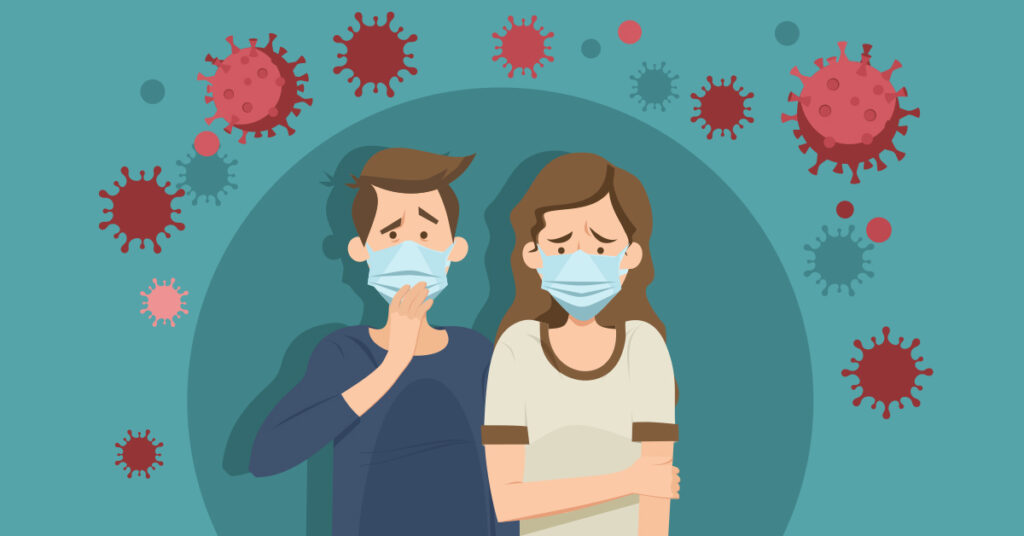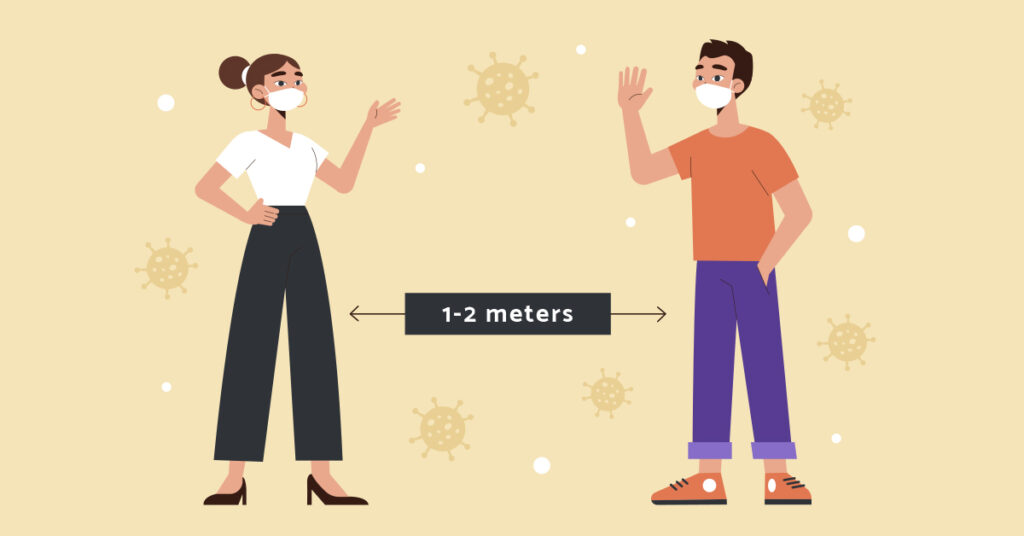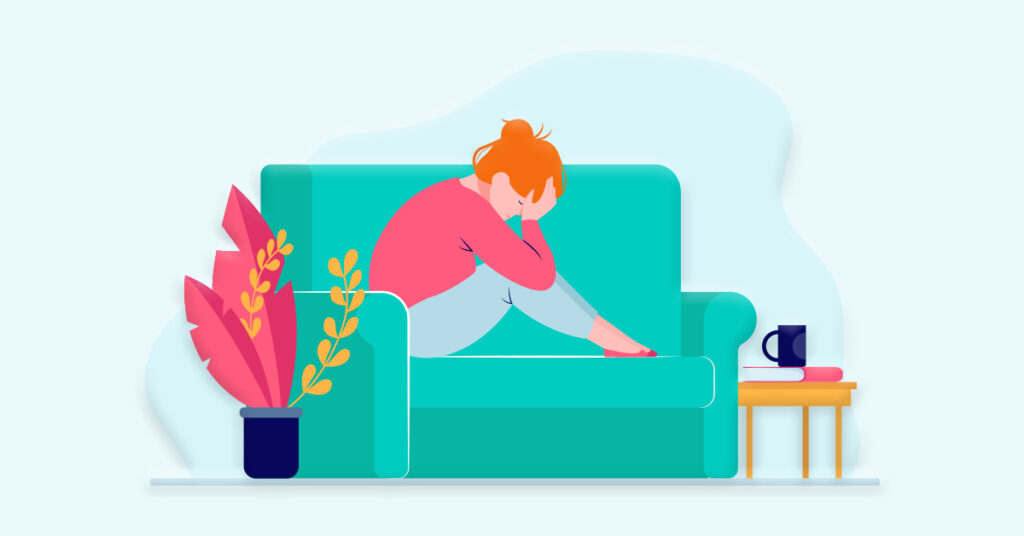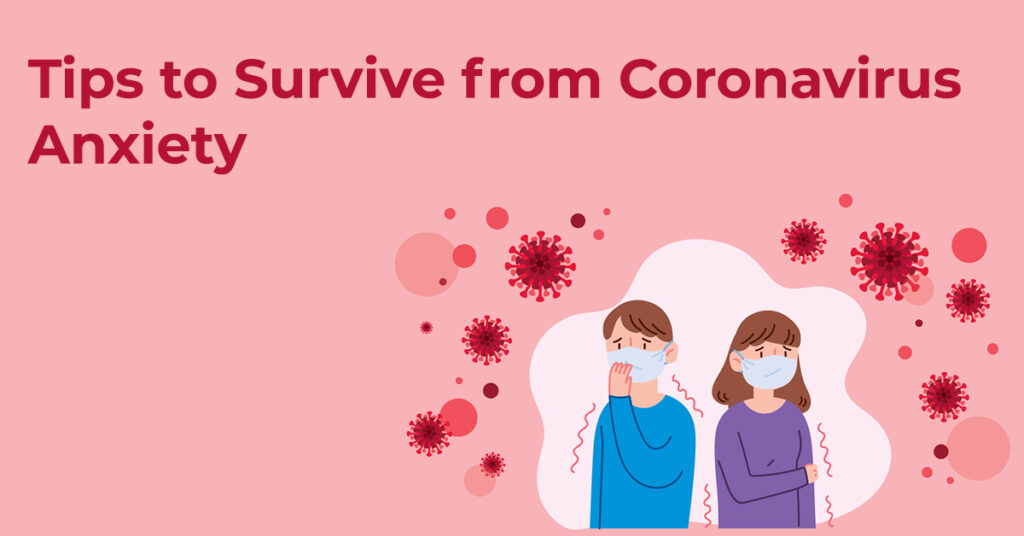The COVID-19 pandemic has majorly affected our lives. A considerable lot of us are confronting difficulties that can be upsetting, overpowering, and cause compelling feelings in grown-ups and kids. General wellbeing activities, for example, social separation, are important to lessen the spread of Coronavirus, however, they can cause us to feel secluded and desolate and can expand pressure and uneasiness. Figuring out how to adapt to pressure in a sound manner will make you, individuals you care about, and everyone around you become stronger.

Stress can cause the accompanying:
Sensations of dread, outrage, pity, stress, deadness, or disappointment
Changes in hunger, energy, wants, and interests
Trouble thinking and deciding
Trouble resting or bad dreams
Actual responses, like migraines, body torments, stomach issues, and skin rashes
Deteriorating of persistent medical conditions
Deteriorating of psychological wellness conditions
Expanded utilization of tobacco, liquor, and different substances
It is normal to feel pressure, nervousness, sorrow, and stress during the COVID-19 pandemic. The following are ways that you can help yourself, others, and your local area oversee pressure.
Media Distancing:
To prevent the spread of Coronavirus, we’ve had to practice social distancing. But to prevent the spread of hysteria, we must distance ourselves from the media. All anxiety stems from uncertainty and a lively imagination that produces catastrophic thoughts. The media, which is 24/7 Coronavirus and virtually all negative, is the driver of these thoughts.
Some patients who are the foremost anxious about the Coronavirus are those that are consuming the foremost news from social media, online, and traditional outlets. The more anxious you are feeling, the more you ought to distance yourself from the media. And if you’re extremely fearful, stop altogether. Do you do Google or research? Stop checking the latest news about the virus. Any vital information you would like to understand, you’ll determine.

Do Not Engage with Worry. Make a move
Whether you’re stressed over getting the infection, your striving business, or being jobless, the more your brain centres around most pessimistic scenario situations, the more restless you are feeling. You can’t stop thoughts from entering your mind, but you’ll prefer to stop dwelling and you’ll prefer to take action to unravel problems. There’s an enormous difference between worrying and problem-solving.
At the point when your brain attempts to snare you into stress, don’t take the lure. If you do, sort of a fish during a lake, you’ll be caught. Tension will endeavor to trap you with many “imagine a scenario in which” questions. Try not to respond to them. React, “Not taking the snare,” dismiss your consideration, and concentrate somewhere else. Spinning your wheels with questions that don’t have answers will take you down the rabbit burrow of fear. Instead, find creative measures to urge you through this storm until you’ll revisit your feet.
None of those measures are going to be comfortable. Like an umbrella and a raincoat, we use them to urge through the storm, to not stop it. Much of hysteria stems from a scarcity of confidence in our ability to handle challenges. Push yourself to require one uncomfortable step at a time. The goal is to remain afloat until the storm passes, and now with a vaccine, the forecast looks brighter.

Focus on Present Odds:
All deaths are tragic and therefore the coronavirus is often deadly but maintaining proper perspective can reduce your anxiety. Little question the symptoms of Coronavirus are often horrible but the overwhelming majority of individuals infected with Coronavirus have mild to moderate symptoms or no symptoms in the least.
The Infection death rate (IFR) is the total number of deaths divided by the entire number of individuals that carry the infection, no matter whether they have clinical symptoms or not. The IFR is the chance of death once you’ve got the virus. This number is difficult to calculate accurately due to the high number of asymptomatic individuals. As of November 2020, the estimated Infection death rate of Coronavirus for various age groups is as follows:
For the purpose of comparison only, the Health care services has stated that influenza has an overall Infection death rate of 0.1% or lower. With increased testing over the last several months also as people spending longer inside due to the weather, the number of cases has risen, yet, the prospect of you or a loved one dying remains remote. But death is feasible and Coronavirus may be a serious illness, which is why anxious people take the bait and dwell. Possibility becomes a probability.
Remind yourself of this oddity, which is excellent. If you’re taking care of yourself properly, albeit you’re in a higher risk category, your risk of death remains low. And if you’re under the age of 59 your risk is very much low. There are roughly 74 million children within us. Between February 1 and Lammas, approximately 13,000 children died from all causes, 105 died of the flu and 45 died of coronavirus and most of them had a pre-existing medical condition. It’s not minimizing the seriousness of Coronavirus but children, teens, and other people in their 20s and 30s shouldn’t worry about dying from coronavirus.
Do Not React to Physical Symptoms:
If you cough, it doesn’t mean you’ve got the Coronavirus. An equivalent is true for others who cough. Allergies, bronchitis, post-nasal drip, and therefore the cold are more common and a more likely explanation. Accept uncertainty as you are doing in other areas of life and assume what’s presumably. Don’t scan your body trying to find symptoms. This conduct builds up your concerns and can expand tension.
Focus on Being Productive and New Ways of Enjoying Life:
Although we’ve no control over the national crisis, we must specialise in where we do have control – our response to the crisis. This is often a chance to undertake something new and do things we haven’t had time for. Organize a messy room, paint a fence, clean the garage, edit the photos on your phone, clean a rusty bike and take it for a ride, and play a parlour game — remember those? You’ll also learn a replacement skill or start a replacement hobby from videos on YouTube or various apps and websites. You can download a free piano course and practice once each day.
Creating and accomplishing puts your attention on what’s satisfying. Consider starting something new: genealogy, gardening, photography, knitting, drawing, cooking, woodworking, video editing, ballroom dance, or chess, just to call a couple of. You’ll start and learn all of those online. Put your consideration on making and achieving, not on the infection.

Engage in Stress Reduction Activities:
That specialization in what you’re grateful for, exercising your body, and relaxing your mind will assist in giving you the peace you desire. Guided meditation, yoga, exercise, and a gratitude journal are all practices that lower stress. Select one or two, study them so you are doing them correctly, and practice every day.
If you and your loved ones aren’t severely sick or experiencing dire financial hardship, be grateful. Once this crisis has passed, perhaps we’ll all appreciate what we deem granted: a healthy society, freedom to collect, dinner with friends, an evening at the films and dancing.

Do Not transcend CDC and WHO Coronavirus guidelines
Compulsive hand washing until your hands are dry and red, beginning all of your clothes before entering the house, and isolating indoors are anxiety’s guidelines, not the CDCs and WHO. People that spray everything in view with bleach and other harsh cleaners should know that disinfectants can irritate the lungs and isn’t necessarily supported by what science knows about the transmission of the virus.
Emanuel Goldman, PhD, a professor of microbiology, biochemistry, and genetics at the New Jersey school of medicine of Rutgers University wrote within the Lancet Infectious Diseases, “In my opinion, the prospect of transmission through inanimate surfaces is extremely small, and only in instances where an infected person coughs or sneezes on a surface and somebody else touches that surface soon within 1-2 hours”.
Dean Blumberg, MD, chief of paediatric infectious diseases at UC Davis Children’s Hospital talked about the likelihood of catching Coronavirus from inanimate surfaces: “You’d need a singular sequence of events. First, someone would wish to urge an outsized enough amount of the virus on a surface to cause infection.
Then, the virus would wish to survive long enough for you to touch that surface and obtain some on your hands. Then, without washing your hands, you’d need to touch your eyes, nose, or mouth.” Our skin may be a protective barrier. As long as you wash your hands and don’t touch your face, there’s no reason to wash packages delivered to your home. Anxious behaviors maintain worry. And to scale back worry, slowly reduce unnecessary behaviors that aren’t recommended.
Preserve Some Sense of Normalcy:
During war II, second-tier baseball players filled certain professionals who were entering the military. Baseball, during a period of war, was significant for the morale of the country. To the extent you’ll, maintaining a structure to your day with some semblance of normalcy will help reduce anxiety. Much has been found out about the infection since the previous spring and specialists are treating it all the more viable now, “Public health care service defines a big exposure to Coronavirus as face-to-face contact within 6 feet with a patient with symptomatic COVID-19 that’s sustained for a minimum of a couple of minutes (and some say quite 10 minutes or maybe 30 minutes).
The prospect of catching COVID-19 from a passing interaction during a public space is therefore minimal.” The tips and tricks to stay away from covid and subsequent articles stress the importance of wearing a mask yet, keep up that the threat of contracting COVID-19 comes from “supported contact inside six feet” not from “a passing cooperation”.
Therefore, wearing a veil when driving a vehicle, practicing outside, or strolling during a calm area alone isn’t required. You would potentially think wearing veils outside is socially capable and in certain urban communities, it’s legally necessary. However, in the event that you end up encountering an exposed individual, there’s no motivation to stretch.

Be Kind to Yourself and also, Have Faith:
It’s typical to feel restless and stressed during a public emergency. Don’t be hard on yourself. Reaching bent relatives and friends who are isolated or in need will boost their spirits and yours. If you’re in good financial standing, be grateful and still pay others for the services they can’t provide. Venmo or mail checks to your housekeeper, hairdresser, or others who are unable to figure.
If you’re unemployed or your business is suffering, this is often tragic and should cause depression or other psychological state issues. Your new job is to manage through the crisis as best as you’ll until it passes. Have faith that it’ll, despite not having all the answers. Having faith or imagining the worst may be a choice. Which one will you choose?
Seek Out Professional Help:
You don’t get to do that alone. If you’re experiencing an escalation of hysteria, ask knowledgeable who can assist you through this difficult time. Most therapists are using telehealth, so you’re not limited to professionals in your area. Medication for anxiety, depression, and insomnia may additionally be needed and may be prescribed by a psychiatrist or your medical care physician. You’ll find a therapist and psychiatrist at the Anxiety and Depression Association of America (ADAA.org).

This list may be a recipe to scale back anxiety. Review it again and put it into practice. Otherwise, it’s like reading a cooking recipe in bed – within the end you’ve got nothing to point out for it.
Remember, this is a difficult time for all hence try to comfort people around you and take care of yourself by engaging in healthcare service and yoga services online.
As the nation fights the Covid-19 pandemic on a conflict balance, India’s customary arrangement of Yoga has been set up as a way to support insusceptibility, improve generally speaking wellbeing and prosperity. Absence of legitimate rest, helpless nourishment, and having a distressing existence, all lead to a debilitated invulnerable framework and weakness to infection.
A predictable yoga practice – alongside specific postures specifically – can even lift the magnificence and gleam all over.

